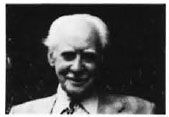- Volume 58 , Number 4
- Page: 730
John H. Hanks 1906-1990

Dr. John H. Hanks died in his sleep on 11 July 1990 after a valiant struggle with cancer. So ended a long and remarkable career in science.
Dr. Hanks was born on 16 September 1906 in Fowlerton, Indiana. He graduated with a B.S., Phi Beta Kappa, from Allegheny College in 1928 and earned his Ph.D., Sigma Xi, from Yale University in 1931. From 1931 to 1932 he worked as a National Research Council fellow at Harvard Medical School with the noted bacteriologist Hans Zinsser. His first papers, published at that time, concerned hypersensitivity to the tubercle bacillus. After 7 years as Assistant and Associate Professor of Bacteriology at George Washington University, he joined the Leonard Wood Memorial Foundation for Leprosy Research, an association that continued throughout his scientific career. From 1939 to 1945, he was stationed in The Philippines. Much of that time, however, due to the war, he and his family were kept incommunicado at the Leprosarium on Culion. It is astonishing that he, nonetheless, was able to continue some important research work during those years. He returned to the United States after World War II and joined the faculty of Harvard Medical School. He remained there until moving to Johns Hopkins in 1959. He retired with the title of Professor Emeritus in 1974, but continued his research and scientific writing until June 1990.
Dr. Hanks' complete dedication to the attack on leprosy is the most inspiring and outstanding feature of his scientific career. His studies concerned primarily the physiology and nutrition requirements of the causative organism of this dreaded disease in order to obtain some clues toward its cultivation. Unfortunately, he was never able to attain that goal. Along the way, however, he made some impressive contributions to fundamental biological and medical research. Among the most notable was his elaboration of general methods for the culture of cells and tissues, culminating in the development of the famous Hanks' Balanced Salt Solution (HBSS). Dr. Hanks and his colleagues also contributed much of the early work on the evocation of an immune response to the leprosy bacillus, which resulted in the crossreaction between BCG and Mycobacterium leprae, a finding that formed the basis of the present-day vaccine trial for leprosy, and on the use of metabolic indicators to measure drug susceptibility. For his scientific work, Dr. Hanks received many honors, including the Barnett L. Cohen Award of the American Society for Microbiology and the Damien-Dutton Award for leprosy research.
All of these distinguished achievements were, however, just the outward manifestations of a deeply dedicated scientist and great humanitarian. He will be remembered by his many students and colleagues for his indomitable enthusiasm and optimism as well as for his great courage in adversity.
-Noel R. Rose, M.D., Ph.D.